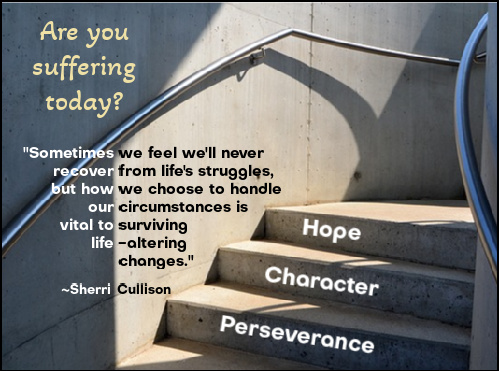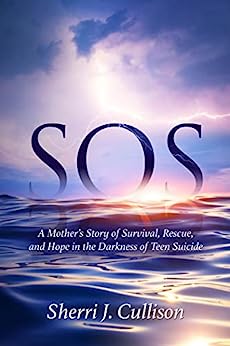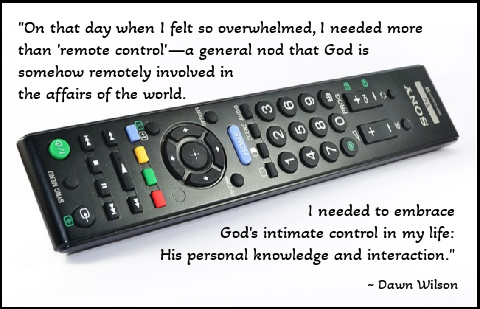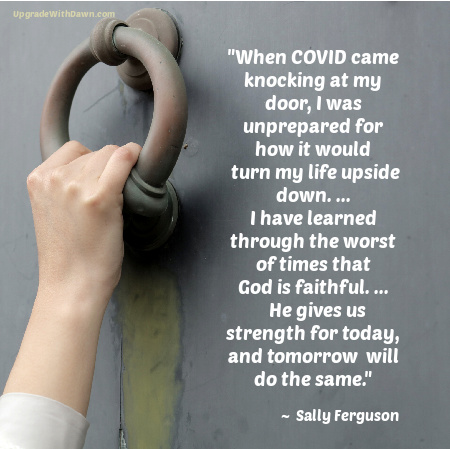Persevering the Staircase of Suffering
Sherri Cullison is a phenomenal woman who has found God to be "enough" in her struggles. In this Perseverance UPGRADE, she shares three ways to cultivate perseverance in times of suffering.
“I am so excited you’re giving me your exercise bike,” Sherri exclaimed. "My uncle stood stunned, eyes wide and straight-faced."
I (Dawn) have to tell you, I met Sherri some years ago, after she suffered a terrible loss. Yet she was engaging and eager to see how God might use her in spite of her pain. I have been blessed to see her perseverance.
In this article, she writes about two different kinds of suffering she's experienced, and how perseverance helped her deal with both.
Sherri continues . . .
Truthfully, I really was excited about the exercise bike. For months, I wanted to lose weight to feel stronger and healthier, but I couldn’t exercise standing due to an old injury.
I had the desire to reduce fat and build muscle, but I felt chained to the recliner, hopeless of ever becoming fit. But now, with a little work, I could pedal myself away on a new journey of fitness.
I knew I had to start slow and easy, so I set a goal of pedaling for five minutes.
Quickly, my lungs labored, and my leg muscles burned.
My will grew weak, and I wanted to give up.
Then I pushed myself a little harder and finished my first five minutes. Hurray.
Now I’m a world-class athlete. Not likely. But what brings success to my goal? Persevering on this uncomfortable contraption for just a few minutes every day.
Several years ago, I thought perseverance wasn’t an option.
After losing my youngest daughter Sarah, I trudged through my grief-walk each day, dreading the next.
- My body operated as if fifty-pound weights were anchored to my ankles.
- My mind floated in a fog and functioned unreliably.
- Tears came easy and the hands of anxiety choked my breath away.
- There were days I wasn’t sure I would even make it to the next.
Sometimes we feel we’ll never recover from life’s struggles, but how we choose to handle our circumstances is vital to surviving life-altering changes.
The suffering we often experience is incomprehensible, yet God’s Word encourages us:
Therefore, since we have been justified through faith, we have peace with God through our Lord Jesus Christ, through whom we have gained access by faith into this grace in which we now stand. And we boast in the hope of the glory of God. Not only so, but we also glory in our sufferings, because we know that suffering produces perseverance; perseverance, character; and character, hope (Romans 5:1-4 NIV).
Certainly, I didn’t feel like “glory-ing” in my suffering when I lost my daughter, but God promised that in my suffering I would find perseverance.
And then character.
And finally, hope.
With hope, I knew I could get through this nightmare.
How do we grasp this hope that God promises? Three helpful answers are found in Hebrews 12.
1. Choose to Run the Race with Endurance.
Hebrews 12:1 (NLT)
Therefore, since we are surrounded by such a huge crowd of witnesses to the life of faith, let us strip off every weight that slows us down, especially the sin that so easily hinders our progress. And let us run with endurance the race that God has set before us.
Sometimes that means letting go of sin’s grip.
When we’re sinning, we don’t want to run with God. We would rather walk on our own.
Often, we need to downsize our responsibilities. It’s okay to say no, and it’s okay to remove those heavy things in our lives that slow us down.
Allow yourself the grace to simplify your life.
2. Choose to Consistently Fix Our Eyes on Jesus.
Hebrews 12:2, 3 (NLT)
We do this by keeping our eyes on Jesus, on whom our faith depends from start to finish. He was willing to die a shameful death on the cross because of the joy he knew would be his afterward.
Think about all he endured when sinful people did such terrible things to him, so that you don’t become weary and give up.
Jesus endured merciless beatings, humiliation, and imminent death. However, we fix our eyes on our current situation and honestly, not enough on Jesus and what He endured.
Pursuing time alone with Him every day will bring light to our dark situation. Pray simple prayers and allow him to carry your heavy load.
3. Choose to Persevere in Living a Life that Others Follow.
Hebrews 12:12 (NLT)
So, take a new grip with your tired hands and stand firm on your shaky legs. Mark out a straight path for your feet. Then those who follow you, though they are weak and lame, will not stumble and fall but will become strong.
Paul wasn’t kidding when he said our hands would be tired and our legs shaky.
Some steps of life begin at the bottom of a long, dark staircase where we hesitate to even take the first step. But God tells us to mark out a straight path. Map your thoughts and actions, and don’t give up.
Push to persevere. Then watch others follow and become strong.
You’ve just built character here. And that, my friend, leads to hope.
What steps will you take this week to pursue your goals and meet glory in your suffering?
 Sherri J. Cullison, author and speaker, knows the pain and devastation life brings. Whether your hope is treading or sinking, Sherri’s heart for hope reveals how we can manage our everyday struggles to
Sherri J. Cullison, author and speaker, knows the pain and devastation life brings. Whether your hope is treading or sinking, Sherri’s heart for hope reveals how we can manage our everyday struggles to claim joy and love life. In her recent book, SOS: A Mother’s Story of Survival, Rescue, and Hope in the Darkness of Teen Suicide, Sherri shares the heartbreaking loss of her daughter and the evidence of God’s healing, forgiveness, and restoration. Sherri and her husband live in Arizona and have two children, seven grandchildren, five pianos, and one RZR. Discover more about Sherri and her story at www.sherrijcullison.com
claim joy and love life. In her recent book, SOS: A Mother’s Story of Survival, Rescue, and Hope in the Darkness of Teen Suicide, Sherri shares the heartbreaking loss of her daughter and the evidence of God’s healing, forgiveness, and restoration. Sherri and her husband live in Arizona and have two children, seven grandchildren, five pianos, and one RZR. Discover more about Sherri and her story at www.sherrijcullison.com
 Post a Comment → Posted on
Post a Comment → Posted on  Monday, July 31, 2023 at 11:00AM
Monday, July 31, 2023 at 11:00AM  Endurance,
Endurance,  Focus on Jesus,
Focus on Jesus,  Model Perseverance,
Model Perseverance,  Perseverance,
Perseverance,  Persevere,
Persevere,  Persevere in Suffering,
Persevere in Suffering,  Run with Endurance,
Run with Endurance,  Sherri Cullison,
Sherri Cullison,  Suffering,
Suffering,  Upgrade with Dawn Upgrade Your Life
Upgrade with Dawn Upgrade Your Life  Perseverance,
Perseverance,  Trials
Trials 








